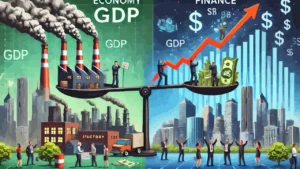We live in an era where financial investment is often seen as the only way to generate wealth. People are scrambling to find the best stock, the hottest cryptocurrency, or the best-performing fund.
Acquiring new skills, gaining experience, starting personal activities: these are the real assets that allow us to understand where and how to invest with greater awareness. The goal is not simply to earn, but to do so in a way that the knowledge and skills acquired are the true engine of individual economic growth.
Disclaimer:
The information provided does not constitute a solicitation for the placement of personal savings. The use of the data and information contained as support for personal investment operations is at the complete risk of the reader.
Contents
#1. The myth of financial investments
In recent decades, the idea has spread that to be financially successful you need to invest in the stock market. Advertisements promise easy money, financial gurus sell miraculous courses, and many people jump into this world without any real preparation. But if investing without knowledge is risky, why not start by investing in yourself first? Only with a solid cultural and experiential base can you really understand where to put your money.
Many people see the stock market as a kind of shortcut to success, because it does not directly involve work: just choose the right stock and wait. However, this vision is dangerously partial. The market is volatile, and without the right skills you risk losing everything in a short time. Furthermore, investing in the stock market is not the only way to grow your capital. There are alternatives that, while requiring commitment, can bring much more significant and stable returns over time.
#2. Experience and self-employment
Read, study, study in depth: the first investment must be in knowledge. Understanding how markets, human psychology, and economic dynamics work is fundamental. But culture does not only mean books: travel, conversations, and life experiences also contribute to forming a broader vision of the world. A well-informed individual is able to seize opportunities that others do not see.
Theory and practice must go hand in hand. No book can replace direct experience. Those who try, fail and try again acquire skills that no stock can ever offer. Every mistake is a lesson, every success a confirmation. Investing in yourself means getting involved, testing strategies, discovering what works and what doesn’t.
You don’t have to start a big business to understand the value of investing in yourself. Even a small personal project can be a great test. Some people start with a blog, some with a buying and selling business, some with a consultancy. The important thing is to understand that every initiative brings with it a valuable lesson, regardless of the immediate result.
Private companies often have the greatest growth potential. Investors who invest in small businesses, perhaps starting from scratch, have the potential to earn much higher returns than those who rely solely on the stock markets. Sure, the risk is greater, but so are the opportunities. An innovative company, a niche business, or a well-run micro-business can generate profits much more effectively than buying shares in established companies.
#3. A real case: +200% on a record
A concrete example concerns a person close to this blog, who has a passion for second-hand goods and local markets. He buys particular objects and resells them online, using specialized platforms. One day, he complained about having sold a vinyl record after a year. I asked him: “At what price compared to the initial one?” His answer was clear: “At 60 euros, while I had paid 20 euros for it.”
I stopped for a moment and pointed out to him: “You made 40 euros on 20 euros, or 200% in a year. You beat all the major stocks listed on the stock exchange in a year, see?” This little episode demonstrates how, by investing in your own intuition and skills, you can obtain returns far superior to those of the financial markets, without having to follow trends or the advice of television experts.
That sale, which initially seemed disappointing, actually hid a great lesson. Thinking of having tied up a capital of 20 euros for a year seemed like a limitation, but it had actually been an investment with an incredible return. The same logic applied on a large scale can transform a simple passion into a profitable business. Local markets, second-hand shops, online sales platforms are real ecosystems in which those who know what to look for can make golden deals.
Furthermore, the value of objects changes over time: sometimes what seems unimportant today can turn out to be a treasure tomorrow. The key is to have patience and knowledge, two elements that no stock market can guarantee, but that a conscious investor can make the most of.
#4. Final considerations
Investing in yourself is the best way to build a solid future. Culture, experience and personal initiatives are the key to really understanding where and how to invest. The stock market is not necessarily the right path for everyone. Some will discover that the real investment is in an independent business, others will find opportunities in niche sectors.
Earnings on the stock market are often perceived as more profitable not so much because you necessarily earn more, but because it does not necessarily involve active work: you invest and wait. However, the risk of losing everything is always present. On the contrary, unlisted companies and independent activities, while involving risks, offer potentially much higher profit margins. Often, the real deals are found outside of regulated markets.
The next time you think about investing, ask yourself, “Am I investing in myself first?” If the answer is yes, then you’ve already taken the first step toward success.











Leave a Reply